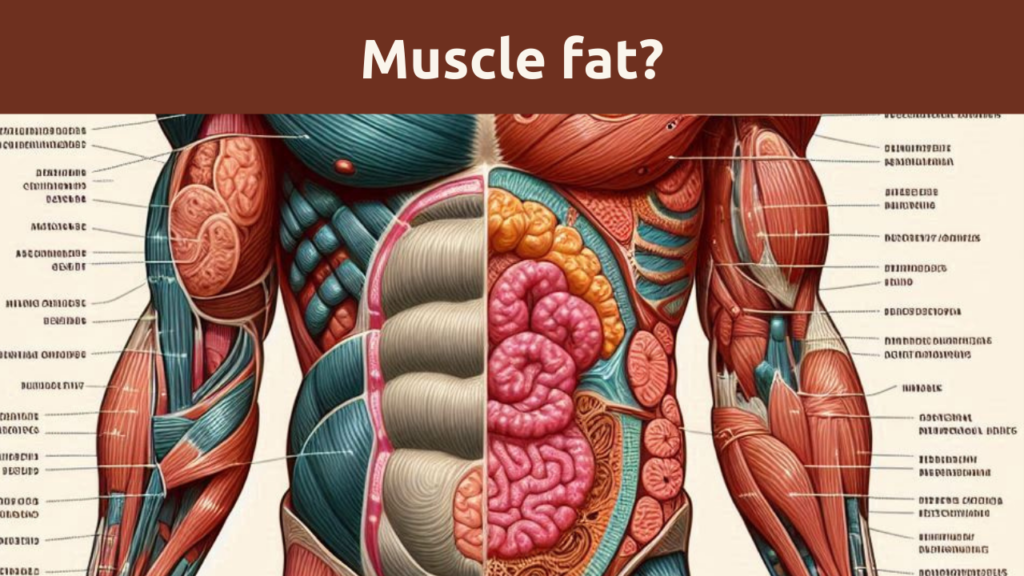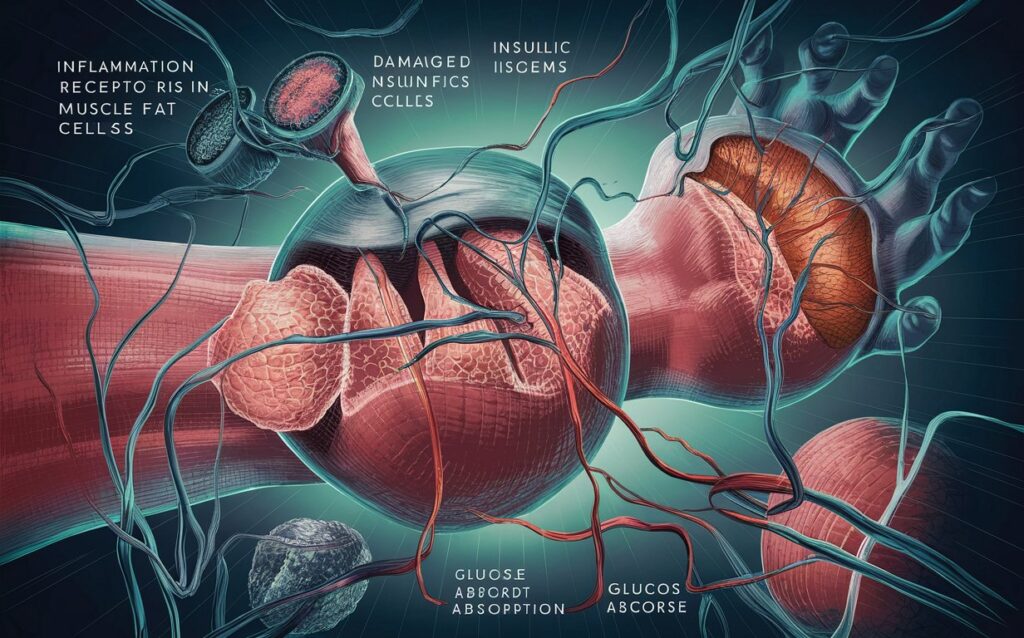We often find ourselves indulging in delicious foods, enjoying the moment without a care for the consequences. While savoring the present is important, there’s a hidden cost to this behavior: the excess calories we consume get stored as fat. When our fat cells can’t hold any more, this fat starts invading our muscles, resulting in muscle fat, which leads to a range of health problems and long-term complications.
Let’s dive into the sneaky mechanics of muscle fat storage and why adopting a healthier lifestyle is essential to keep our muscles and overall health in peak condition.

The Mechanics of Fat Storage in Muscles
- Overflowing Fat Cells: Normally, fat is stored in our fat cells. But when these cells are full, the excess fat spills over into our muscles, causing all sorts of disruptions.
- Couch Potato Syndrome: Exercise does more than just burn calories. It triggers the release of hormones and enzymes like myokines, which are pivotal in fat metabolism. These powerhouses burn fat around muscles and prevent new fat deposits. A sedentary lifestyle, however, keeps these beneficial substances from being released, leading to fat build-up in muscles.
- Protein Shortage: Protein is essential for muscle growth and repair. Yet, an astonishing 80% of people suffer from protein deficiency, impeding muscle development. Without enough protein, fat fills in the gaps meant for muscle tissue, increasing fat deposits in muscles. Combat this by including high-quality protein sources like lean meats, fish, eggs, dairy, beans, and legumes in your diet.
- New Fat Cells Invading: Typically, the number and size of fat cells are set by age two. But in obese individuals, leptin resistance can trigger new fat cells to grow within muscles, worsening the fat accumulation. Fat cells, or adipocytes, usually sit between muscle and skin cells. But when they multiply or grow too large, they invade muscle tissue. This is especially common in obese individuals with leptin resistance, leading to new fat cells in muscles and worsening the problem.
- Post-Injury Slump: Injuries like ligament tears require rest, sidelining exercise routines. Many people don’t return to their old exercise habits post-recovery, allowing fat to infiltrate their muscles. A structured rehab plan and a gradual return to physical activity are crucial to prevent this.
- Steroid Overload: Steroids can be life-saving, but excessive use for non-medical reasons can lead to rapid weight gain and fat deposits in muscles. Steroids boost appetite, leading to overeating and fat storage.
- Hormone Havoc: Hormonal imbalances can significantly affect fat distribution. Testosterone fluctuations in men and changes in estrogen and progesterone in women contribute to muscle fat buildup. Regular check-ups and hormone regulation can help maintain a healthy balance.
The Consequences of Fat in Muscles
Fat deposits in muscles bring a host of problems:

- Stiff Muscles: Muscles need to expand and contract smoothly. Fat deposits reduce elasticity, messing up energy release and blood circulation.
- Protein Synthesis Blocked: Muscles are always regenerating. Fat deposits block this process, preventing new muscle cells from developing.
- Inflammation and Insulin Issues: Over time, fat cells cause inflammation, damaging insulin receptors in muscles and hindering glucose absorption. This leaves glucose in the blood, causing fatigue and low energy.
- Bone Health at Risk: Muscles and bones are interconnected. Fat deposits in muscles can spread to bones, reducing bone density and health.
- Shrinking Muscles: Fat restricts muscle movement, leading to muscle shrinkage and weaker muscle function.
The Solution: Embrace a Healthy Lifestyle
Preventing these issues requires a healthy lifestyle. Here are some actionable steps:

- Stay Active: Make it a habit to engage in both strength training and cardiovascular exercises. These workouts are essential for keeping your muscles robust and active. Strength training builds muscle mass, while cardio helps burn excess calories and fat. Together, they ensure that your muscles remain toned and free from fat deposits.
- Eat Smart: Prioritize a diet that includes a variety of proteins, healthy fats, and complex carbohydrates. Avoid consuming excessive calories and stay away from processed foods. A well-balanced diet supports muscle growth and helps maintain a healthy weight, preventing muscle fat buildup. Include plenty of fruits, vegetables, lean meats, fish, nuts, seeds, and whole grains in your meals.
- Check Hormones: Schedule regular medical check-ups to monitor your hormonal levels. Hormonal imbalances can contribute to muscle fat accumulation. Early detection and management of these imbalances are crucial for maintaining muscle health and overall well-being. Hormone regulation through lifestyle changes, medications, or therapies can significantly impact your muscle health.
- Ditch Steroids: Steer clear of steroid use unless prescribed by a healthcare professional for specific medical conditions. Misuse of steroids can lead to rapid weight gain and muscle fat deposits. Focus on natural methods to build muscle, such as proper nutrition, regular exercise, and adequate rest. This approach ensures sustainable and healthy muscle development.
- Recover Right: If you experience an injury, follow a well-structured rehabilitation plan to regain your strength and return to your regular exercise routine gradually. Proper recovery is crucial for preventing muscle atrophy and fat accumulation. Engage in physical therapy if necessary, and start with low-impact exercises before resuming more intense workouts. This will help maintain muscle integrity and function.
The Consequences of Muscle Fat
- Elasticity Loss: Muscles are designed to flex and stretch smoothly. When fat infiltrates muscle tissue, it causes stiffening, which disrupts this natural flexibility. This loss of elasticity impairs the release of energy and hampers proper blood circulation, leading to reduced muscle efficiency and endurance.
- Blocked Protein Production: Muscles are in a constant state of renewal, generating new cells to replace old ones. However, the presence of fat deposits obstructs this regenerative process. This blockage prevents the formation of new muscle cells, resulting in weaker muscles that cannot repair or grow effectively.
- Inflammation and Insulin Resistance: Fat cells within muscles can trigger inflammation, which in turn damages insulin receptors. Damaged receptors hinder glucose absorption, causing excess glucose to remain in the bloodstream. This condition leads to fatigue and low energy levels and raises the risk of developing insulin resistance and diabetes.
- Compromised Bone Health: The relationship between muscle and bone health is intimate. Fat deposits in muscles can extend to bones, diminishing their density and overall strength. Lower bone density heightens the risk of fractures and osteoporosis over time, posing significant long-term health threats.
- Muscle Shrinkage: Fat accumulation restricts the natural movement of muscles, causing them to shrink. This atrophy weakens muscle function, making everyday activities more difficult and reducing overall physical performance.
Live Healthy: Your Muscles Will Thank You
Prevent these issues with a healthy lifestyle. Here’s how:
- Exercise Regularly: Incorporate a blend of strength training and cardiovascular exercises into your daily routine. Strength training helps in building and maintaining muscle mass, while cardio burns excess fat, keeping your muscles robust and active.
- Eat a Nutritious Diet: Focus on consuming a balanced diet rich in proteins, healthy fats, and complex carbohydrates. These nutrients are vital for muscle health and growth. Steer clear of excessive calories and processed foods to prevent fat accumulation in your muscles.
- Monitor Hormone Levels: Schedule regular medical check-ups to detect and manage hormonal imbalances early. Hormones significantly influence muscle health, and maintaining their balance can help prevent fat deposits in muscles.
- Avoid Steroid Use: Unless prescribed by a doctor, avoid using steroids. Steroid misuse can cause rapid and unhealthy weight gain, leading to muscle fat buildup. Instead, rely on natural methods like proper nutrition and consistent exercise to build muscle.
- Recover Properly: After an injury, adhere to a structured rehabilitation plan. Gradually ease back into your exercise routine to regain strength and prevent fat from settling in your muscles. Proper recovery is essential for maintaining muscle health and function.
Conclusion
Excess fat deposits in muscles pose significant health risks, disrupting muscle function and leading to long-term complications. Prioritize a healthy lifestyle to prevent these issues and keep your muscles and overall health in top shape. Aim to be fit and healthy, not just for looks but for your long-term well-being. Remember, a balanced diet, regular exercise, and mindful living are the keys to a healthier, happier life. Embrace these habits today, and your future self will thank you!
